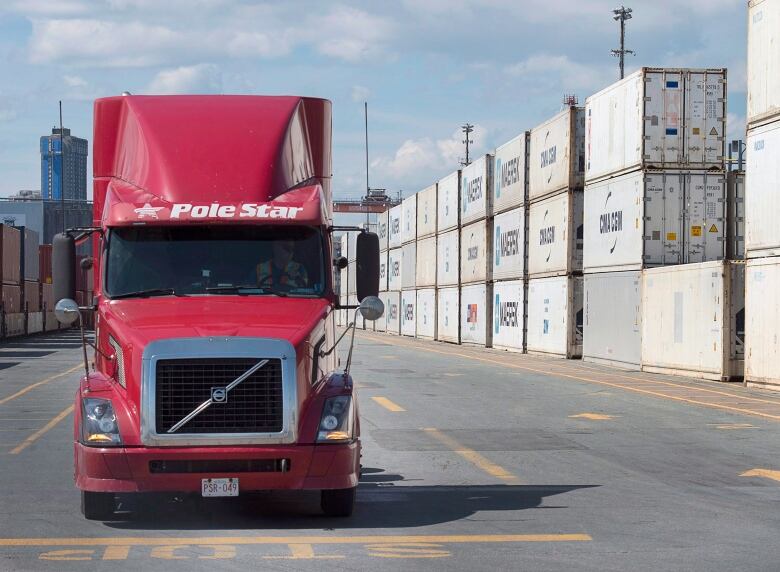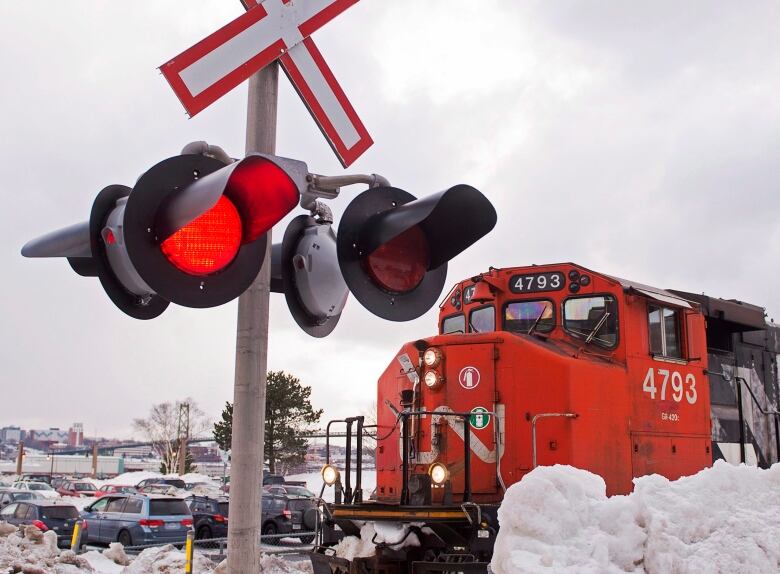CN Rail lays off staff as pipeline protests limit deliveries to Maritimes
Union says 7 CN employees in Moncton, 3 in Halifax temporarily out of work

CN Rail announced on Thursday it wasshutting down its entire networkeast of Toronto becauseprotesters near Belleville, Ont., are maintaining their blockadeacross the main line. Now the company is layingoff some of its Eastern Canadian staff.
Railway blockades are being felt across the Maritime provincesas propane runs low and pressure buildson trucking companies to make crucial deliveries.
Demonstrations and blockades have been taking place across the country in support of theWet'suwet'en hereditary chiefs fighting the Coastal GasLink pipeline in northern B.C.
Alexandre Boul, who speaks for CN Rail, said temporary layoffs notices were sent to employeesworking in Eastern Passage, N.S.,Moncton, N.B., Charny, Que., and Montreal.
"Our shutdown is progressive and methodical to ensure that we are well set up for recovery, which will come when the illegal blockades end completely," he said in an email.
A spokesperson for the union,Bruce Snow, said there were seven people temporarily laid off in Moncton and three in Halifax.
But he said this is just the beginning.
"We do, however, anticipate a much larger impact should the blockades continue to reduce or shut down the CN eastern network."
Rail cars carry 3 times what trucks do
Jean-Marc Picard, executive director of the Atlantic Provinces Trucking Association, said they startedto see an impact late last week.
"Obviously if things keep up, we're going to be even busier," he said, adding that one rail car is the equivalent of three trucks.
"We can't handle all the rail traffic that's sitting there, it would be logistically impossible. But we're certainly doing what we can to alleviate the impact on communities."

Picard said they are prioritizing based on need, but still have to keep up with their regular demands. He also said they can't operate beyond the industry's regulations, which limits how many hours a driver can work within a week.
"People don't realize how crucial it is, transportation to communities. Whether it's medical supplies, food, fuel," he said.
Picard also said, even if the situation is resolved tomorrow, getting out the backlog of supply "will drag on for weeks and weeks."

The president and CEO of the Canadian Propane Association said it's just a matter of days before the Maritime provinces start to see a shortage.
"This is an emergency. People have to understand that, and those that are protesting have to understand that there needs to be resumption of the services," Nathalie St-Pierre said on Sunday.
"We haven't seen any progress in terms of finding solutions now for the issues of getting the transportation to be back to normal. So it's very troublesome."
Acadian Seaplantsin Nova Scotia, which manufactures products from seaweed that are shipped all over the world, was forced to switch from propane to oil on Sunday afternoon.

Jean-Paul Deveau, president and CEO of Acadian Seaplants, said that means the cost of operations has increased by 62 per cent.
"It is unacceptable that a small group of citizens may choose to ignore the decisions of our courts and have such an economic impact throughout the country," Deveau said in an email.
St-Pierre said propane companies are rationing their supply and are prioritizing those with the most urgent need.
But she said local governments may need to start preparing for what happens if the rail stoppages continue.
"Some industries can switch back to oil or other sources, but that's also going to run out eventually."
MORE TOP STORIES












_(720p).jpg)


 OFFICIAL HD MUSIC VIDEO.jpg)
.jpg)



























































































